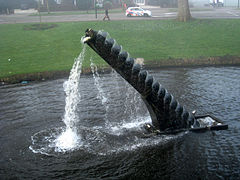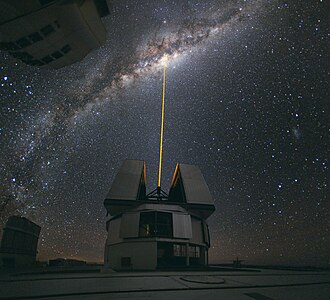Portal:Physics
| Physics Portal Main Page | Physics Textbook | Wikiprojects and things to do |
The Physics Portal


Physics is the scientific study of matter, its fundamental constituents, its motion and behavior through space and time, and the related entities of energy and force. Physics is one of the most fundamental scientific disciplines. A scientist who specializes in the field of physics is called a physicist.
Physics is one of the oldest academic disciplines. Over much of the past two millennia, physics, chemistry, biology, and certain branches of mathematics were a part of natural philosophy, but during the Scientific Revolution in the 17th century, these natural sciences branched into separate research endeavors. Physics intersects with many interdisciplinary areas of research, such as biophysics and quantum chemistry, and the boundaries of physics are not rigidly defined. New ideas in physics often explain the fundamental mechanisms studied by other sciences and suggest new avenues of research in these and other academic disciplines such as mathematics and philosophy.
Advances in physics often enable new technologies. For example, advances in the understanding of electromagnetism, solid-state physics, and nuclear physics led directly to the development of technologies that have transformed modern society, such as television, computers, domestic appliances, and nuclear weapons; advances in thermodynamics led to the development of industrialization; and advances in mechanics inspired the development of calculus. (Full article...)

Wind is the natural movement of air or other gases relative to a planet's surface. Winds occur on a range of scales, from thunderstorm flows lasting tens of minutes, to local breezes generated by heating of land surfaces and lasting a few hours, to global winds resulting from the difference in absorption of solar energy between the climate zones on Earth. The two main causes of large-scale atmospheric circulation are the differential heating between the equator and the poles, and the rotation of the planet (Coriolis effect). Within the tropics and subtropics, thermal low circulations over terrain and high plateaus can drive monsoon circulations. In coastal areas the sea breeze/land breeze cycle can define local winds; in areas that have variable terrain, mountain and valley breezes can prevail.
Winds are commonly classified by their spatial scale, their speed and direction, the forces that cause them, the regions in which they occur, and their effect. Winds have various defining aspects such as velocity (wind speed), the density of the gases involved, and energy content or wind energy. In meteorology, winds are often referred to according to their strength, and the direction from which the wind is blowing. The convention for directions refer to where the wind comes from; therefore, a 'western' or 'westerly' wind blows from the west to the east, a 'northern' wind blows south, and so on. This is sometimes counter-intuitive. Short bursts of high speed wind are termed gusts. Strong winds of intermediate duration (around one minute) are termed squalls. Long-duration winds have various names associated with their average strength, such as breeze, gale, storm, and hurricane. (Full article...)
Did you know -

- ...that on November 2009, CERN's Large Hadron Collider became the world's highest energy particle accelerator?
- ...that 2005 was endorsed by the United Nations as the World Year of Physics?
Selected image -
Archimedes' screw, also called the Archimedean screw or screwpump, is a machine historically used for transferring water from a low-lying body of water into irrigation ditches. The screw pump is commonly attributed to Archimedes on the occasion of his visit to Egypt, but this tradition may reflect only that the apparatus was unknown to the Greeks before Hellenistic times and introduced in his lifetime by unknown Greek engineers. Some writers have suggested that the device may have been in use in Assyria some 350 years earlier.
-
Archimedes' screw was operated by hand and could raise water efficiently
-
An Archimedes' screw in Huseby south of Växjö Sweden
-
Archimedes' screw]
-
Roman screw used to dewater mines in Spain
-
Modern Archimedes' screws which have replaced some of the windmills used to drain the polders at Kinderdijk in the Netherlands
-
Archimedes' screw as a form of art by Tony Cragg at 's-Hertogenbosch in the Netherlands
Related portals
November anniversaries
- 1952 - detonation of the first Hydrogen bomb, code named "Ivy Mike".
- 1947 - invention of the first transistor, between November 17 to December 23. APS.
- 1930 - Patent granted for Einstein-Szilard refrigerator designed by Albert Einstein and Leó Szilárd. APS.
- 1919 - Elmer Imes's published work presented the first accurate measurement of the distance between atoms in molecules with high resolution infrared spectroscopy. APS.
- 1915 – Einstein's presentation to the Prussian Academy of Science specifies how the geometry of space and time is influenced by whatever matter is present. (see: General relativity and APS)
- 1895 - Wilhelm Conrad Roentgen discovers X-rays.
- 1887 - Michelson–Morley experiment provided strong evidence against the luminiferous ether. APS.
- 1872 - death of Mary Somerville who gained an international reputation as a scientist in the intervals of raising a family of six children. APS
- 1783 - John Michell predicted the existence of black holes, and the possibility of a luminous twin to aid in detection. APS
- 1676 – using his first quantitative measurement of the speed of light, Ole Rømer accurately predicts the delay of eclipse of Io
Births
- 1934 – Carl Sagan
- 1932 - Melvin Schwartz
- 1929 - Richard E. Taylor
- 1925 - Simon van der Meer
- 1902 - Eugene Wigner
- 1837 - Johannes Diderik van der Waals
- 1867 - Marie Curie (Nov. 7)
- 1828 - Balfour Stewart
- 1878 - Lise Meitner (Nov. 7)
- 1887 - Henry Moseley
- 1888 - C V Raman (Nov. 7)
- 1892 - Dmitri Skobeltsyn (Nov. 24)
General images
Categories

Fundamentals: Concepts in physics | Constants | Physical quantities | Units of measure | Mass | Length | Time | Space | Energy | Matter | Force | Gravity | Electricity | Magnetism | Waves
Basic physics: Mechanics | Electromagnetism | Statistical mechanics | Thermodynamics | Quantum mechanics | Theory of relativity | Optics | Acoustics
Specific fields: Acoustics | Astrophysics | Atomic physics | Molecular physics | Optical physics | Computational physics | Condensed matter physics | Nuclear physics | Particle physics | Plasma physics
Tools: Detectors | Interferometry | Measurement | Radiometry | Spectroscopy | Transducers
Background: Physicists | History of physics | Philosophy of physics | Physics education | Physics journals | Physics organizations
Other: Physics in fiction | Physics lists | Physics software | Physics stubs
Physics topics
Classical physics traditionally includes the fields of mechanics, optics, electricity, magnetism, acoustics and thermodynamics. The term Modern physics is normally used for fields which rely heavily on quantum theory, including quantum mechanics, atomic physics, nuclear physics, particle physics and condensed matter physics. General and special relativity are usually considered to be part of modern physics as well.
More recognized content
Associated Wikimedia
The following Wikimedia Foundation sister projects provide more on this subject:
-
Commons
Free media repository -
Wikibooks
Free textbooks and manuals -
Wikidata
Free knowledge base -
Wikinews
Free-content news -
Wikiquote
Collection of quotations -
Wikisource
Free-content library -
Wikiversity
Free learning tools -
Wikivoyage
Free travel guide -
Wiktionary
Dictionary and thesaurus



![Archimedes' screw]](http://upload.wikimedia.org/wikipedia/commons/thumb/8/82/Archimedes_screw.JPG/269px-Archimedes_screw.JPG)











































































